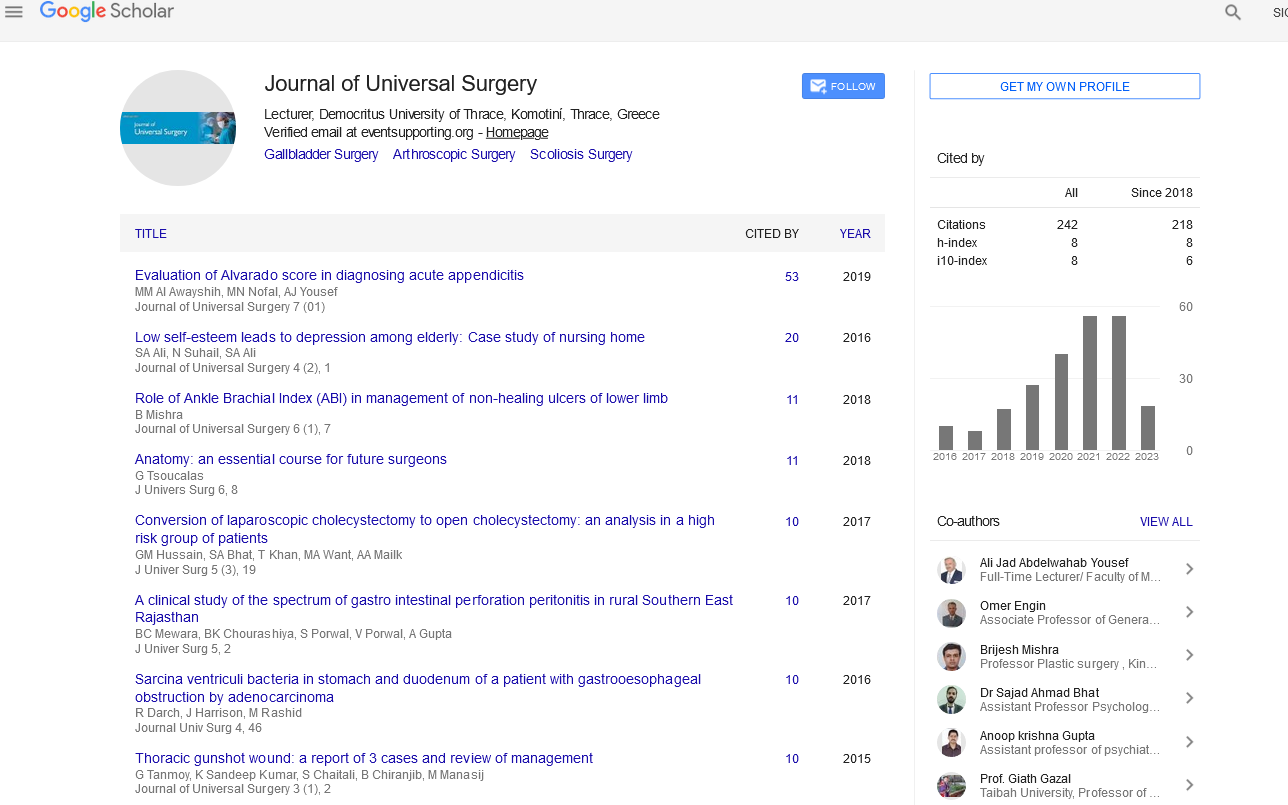Perspective - (2024) Volume 12, Issue 2
Advancements in Modern Surgical Techniques: A Glimpse into the Future of Medicine
Annie Labster*
Department of General Surgeon, Unversity of Launceston, Launceston, Australia
*Correspondence:
Annie Labster, Department of General Surgeon, Unversity of Launceston, Launceston,
Australia,
Email:
Received: 28-Mar-2024, Manuscript No. IPJUS-24-14714;
Editor assigned: 01-Apr-2024, Pre QC No. IPJUS-24-14714 (PQ);
Reviewed: 15-Apr-2024, QC No. IPJUS-24-14714;
Revised: 23-Apr-2024, Manuscript No. IPJUS-24-14714 (R);
Published:
30-Apr-2024
Introduction
In the rapidly evolving landscape of modern medicine, surgical
techniques have undergone transformative advancements,
revolutionizing patient care and outcomes. From minimally
invasive procedures to robotic-assisted surgeries, the
contemporary surgical arena is characterized by innovation,
precision, and improved patient recovery. This article explores
the latest trends and technologies shaping the field of surgery,
offering a glimpse into the future of medical interventions.
Description
Minimally invasive surgery
Minimally Invasive Surgery (MIS) has emerged as a
cornerstone of modern surgical practice, offering numerous
advantages over traditional open procedures. Utilizing small
incisions and specialized instruments, MIS techniques reduce
trauma to surrounding tissues, leading to faster recovery times,
decreased postoperative pain, and shorter hospital stays.
Procedures such as laparoscopy and endoscopy have become
standard across various surgical specialties, including
gastroenterology, gynecology, and urology. Moreover,
advancements in imaging modalities, such as fluoroscopy and
intraoperative ultrasound, enhance the precision and safety of
minimally invasive procedures, enabling surgeons to navigate
complex anatomical structures with greater confidence.
Robot-assisted surgery
Robot-assisted surgery represents a paradigm shift in surgical
innovation, combining the precision of robotic technology with
the dexterity of skilled surgeons. Systems like the da Vinci
surgical system enable surgeons to perform intricate procedures
with enhanced visualization and control, translating into
improved patient outcomes and reduced complications. The
integration of haptic feedback and augmented reality further
enhances the surgeon's capabilities, allowing for more precise
tissue manipulation and anatomical dissection. While robotassisted
surgery initially found applications in urology and
gynecology, its scope has expanded to include cardiac, thoracic,
and colorectal surgeries, underscoring its versatility and
potential in modern healthcare.
Enhanced imaging and navigation
Advancements in imaging technologies have revolutionized
surgical planning and intraoperative navigation, facilitating more
accurate and efficient procedures. High-resolution imaging
modalities such as Magnetic Resonance Imaging (MRI),
Computed Tomography (CT), and Three-Dimensional (3D)
reconstructions provide detailed anatomical information,
enabling surgeons to visualize pathology and plan surgical
approaches with unprecedented precision. Moreover, real-time
navigation systems incorporating GPS-like tracking mechanisms
enhance intraoperative guidance, particularly in complex
surgeries involving delicate structures or limited visibility. These
innovations not only streamline surgical workflows but also
mitigate the risk of intraoperative complications, ultimately
improving patient safety and outcomes.
Precision medicine and personalized surgery
The advent of precision medicine has ushered in a new era of
personalized healthcare, tailoring medical interventions to
individual patient characteristics and genetic profiles. In the field
of surgery, precision medicine encompasses a wide array of
strategies, including targeted therapies, genetic testing, and
predictive modeling. By leveraging genomic data and molecular
biomarkers, surgeons can identify patients at higher risk of
complications or treatment resistance, allowing for tailored
interventions and optimized patient care pathways. Additionally,
advances in regenerative medicine and tissue engineering hold
promise for personalized surgical solutions, such as organ
transplantation and tissue regeneration, further expanding the
horizons of modern surgery.
Integration of artificial intelligence
Artificial Intelligence (AI) is increasingly permeating every
facet of healthcare, offering innovative solutions to complex
challenges in surgery. Machine learning algorithms analyze vast
amounts of patient data to predict surgical outcomes, optimize
treatment strategies, and automate routine tasks, thereby
augmenting the capabilities of surgical teams and improving
overall efficiency. AI-powered image analysis tools aid in the
interpretation of medical images, facilitating early detection of
abnormalities and guiding treatment decisions.
Furthermore, robotic surgical systems equipped with AI
algorithms can adapt to dynamic surgical environments,
enhancing procedural precision and patient safety. As AI
continues to evolve, its integration into surgical practice
promises to rede ine standards of care and shape the future of
medicine.
Challenges and ethical considerations
Despite the remarkable progress in modern surgical
techniques, several challenges and ethical considerations loom
large on the horizon. The high cost of advanced surgical
technologies presents barriers to accessibility and equity in
healthcare, exacerbating disparities in patient outcomes.
Moreover, concerns regarding patient privacy, data security, and
the ethical use of AI in healthcare underscore the need for robust
regulatory frameworks and ethical guidelines. Additionally, the
learning curve associated with novel surgical techniques and
technologies necessitates comprehensive training programs and
continuous professional development for surgical teams.
Addressing these challenges will be crucial in harnessing
the full potential of modern surgical innovations while
ensuring equitable and ethical healthcare delivery.
Conclusion
The landscape of modern surgery is characterized by
unprecedented innovation, driven by advancements in
technology, imaging modalities, and personalized medicine.
From minimally invasive procedures to robot-assisted surgeries
and precision interventions, contemporary surgical techniques
offer improved patient outcomes, enhanced safety, and greater
efficiency. As we look ahead, the integration of arti icial
intelligence, regenerative medicine, and personalized surgical
solutions holds promise for further revolutionizing the ield of
surgery. However, addressing challenges related to accessibility,
equity, and ethical considerations will be imperative in realizing
the full potential of modern surgical innovations and delivering
optimal patient care in the years to come.
Copyright: Labster A (2024) Advancements in Modern Surgical Techniques: A Glimpse into the Future of Medicine. J Univ Surg Vol.12 No.2: 012





